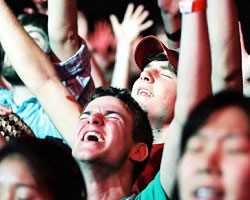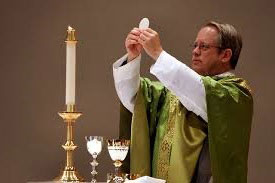

|
| Musical Musings: Liturgy |
|
|
The Liturgy Is Not Me:
Why We All Should Worship Like CatholicsThis article is reprinted from the blog, The Cordial Catholic, with the kind permission of the author. As an eager Evangelical, I once wrote an article about tradition in the context of a Sunday morning worship service. Long before becoming Catholic, I was processing the idea that all Christian modes of faith come with a certain level of tradition, even if it wasn't as the high liturgical ritual of a Catholic Mass. Here's how a typical Sunday morning in my non-denominational church would look. We gathered in the pews before the service began catching up with friends before the music started. And then, it began. Up-tempo, contemporary worship music which kept very much in step with the contemporary indie rock music of its time. We'd sing two or three songs, with the band up front, centre stage, and then the worship leader would pray. Then we'd sing another song, and then maybe another, and then the pastor would take the stage. We'd close our eyes to pray while the worship band miraculously disappeared off the stage. (Occasionally the drummer would knock over a cymbal on his way out from behind the drumkit and the illusion would be shattered!) Then the lead pastor would preach. The sermon, the focal point of the morning, would last about 30 minutes and leave us with an intellectual challenge to consider for the week, and then we'd pray. Years ago, in my Evangelical young adulthood, I reflected on these traditions, on why we structured our worship services in a particular way, and wondered, "Why?" And I was left wondering. What, I wondered, were the origins of our worship service? Why did we sing, then pray, then sing, and then listen to a sermon? Why was this particular lecture kind of format the way it was done; why did we do it this way? Who says? And who's making the decisions? Was is the senior pastor? The denomination? The board of elders? Or was my church, a church amongst thousands, just going with the flow — doing it the way its always been done? I had a lot of questions and the answers were anything but satisfactory. Back then I realized that my non-denominational, Evangelical church had a very particular set of traditions — even if they weren't explicitly defined and the roots of these traditions, I realized, were kind of murky. On the other hand, the ancient traditions of the Catholic Church seemed firmly fixed in history. Terra firma. Much better roots. Was I worshiping wrong? The realization concerned me. Back then I didn't know any better. I didn't know the word "liturgy" and didn't know a thing about liturgical churches — churches that used a define set of worship practices which were rooted in history — all I knew is that I had no idea why we worshiped the way we did; and I didn't feel comfortable not knowing. What occurred to me, way back when, was that I was what was defining my experience of God on a Sunday morning. I choose where to worship, and how to worship, based on a number of factors: the music, the community, the quality of the preaching — and all of these factor were down to my interpretation; my subjective impressions. My experience of the evangelical liturgy was me. But this needn't be the case. In a culture so focused on "me" and my interior life — my wants, my needs, my opinions on social media — I detect a distinct trickle flowing in the opposite direction. A movement which seeks to find something deeper outside of ourselves. Enter, the ancient liturgy of the Catholic Church. See, the way we worship in the context of the Mass is a form as old as Christianity itself. We can find evidence of this distinct way of celebrating our life in Christ in a text called the Didache, a document of the ancient Church which is dated to be contemporary to the books of the New Testament. The Didache outlines a form of worship which sounds very much like the Mass, something ancient and weighty. A form of worshipping God that, being highly prescriptive, is ultimately incredibly freeing. Because worship in the setting of the ancient Catholic Mass doesn't require me to feel a certain way, or subscribe to certain sentiments, or to approve of every element of a worship service. And if I don't like how we worship, I don't really have the luxury of going elsewhere. What it means is that as a Catholic the Liturgy is not about me. It isn't about the style of music or the words we speak or the prayers we pray conforming to my tastes; it's about conforming my tastes to the ultimate worship taking place in Heaven.
But if I'm the one in charge of choosing how I worship then I have my priorities wrong. If we're tailor-making our worship services to intentionally appeal to a particular audience we're doing it wrong. The "audience" of our worship ought to be God. And what we should be tailoring is our hearts to conform to Christ. The Catholic Church describes the Liturgy as something that is "revealed" to us here on earth. In Revelation — the last book of the Bible — we get a small glimpse into what heavenly worship looks like: angels gathered around an altar, incense — the prayers of the saints — floating up to the Lamb of God. What the Catholic Church tries to capture in the way it worships, corporately, is precisely this kind of worship. And it's incredible.
It's a breath-takingly brilliant theology. And all that to say, if we're going to think about how we worship — or re-think how we worship — I'd throw my lot in with the Catholics: To worship in a great tradition that I don't dictate that stretches back to the very beginning of the Christian Church with a clear and concise origin and with deep, rich theological links to the very same worship service happening right now in Heaven. A way or worshiping that forms us into Christ, not forcing Christ to conform to our tastes. It's worth considering. Article written 29 March 2018
Copyright © 2008-2017 by Patheos. All rights reserved. |
Submit Your Music / Contact Us / Company Description / Links
 Don't get me wrong.
A tradition of worship born out of the 1950's revival tent meeting isn't all bad.
My evangelical roots helped to fire me up for Christ — and prime me for the kind of rigorous Bible study and genuine discipleship that eventually led me to become Catholic.
And, megachurches with their lights and smoke machines and skinny-jeaned worship pastors can certainly play a role in making saints.
(And I love a good pair of skinny jeans.)
Don't get me wrong.
A tradition of worship born out of the 1950's revival tent meeting isn't all bad.
My evangelical roots helped to fire me up for Christ — and prime me for the kind of rigorous Bible study and genuine discipleship that eventually led me to become Catholic.
And, megachurches with their lights and smoke machines and skinny-jeaned worship pastors can certainly play a role in making saints.
(And I love a good pair of skinny jeans.)
 In a Catholic Mass every small gesture, every visual, audio, and physical cue, is intended to key us into the great worship song being sung in heaven.
In fact, the Catholic Church teaches that the Mass is essentially never ending.
It began at the last supper and extends forward to the end of time, so to speak.
And when we worship we're connecting up with all of that and with the same celebration taking place, simultaneously, in heaven.
In a Catholic Mass every small gesture, every visual, audio, and physical cue, is intended to key us into the great worship song being sung in heaven.
In fact, the Catholic Church teaches that the Mass is essentially never ending.
It began at the last supper and extends forward to the end of time, so to speak.
And when we worship we're connecting up with all of that and with the same celebration taking place, simultaneously, in heaven.